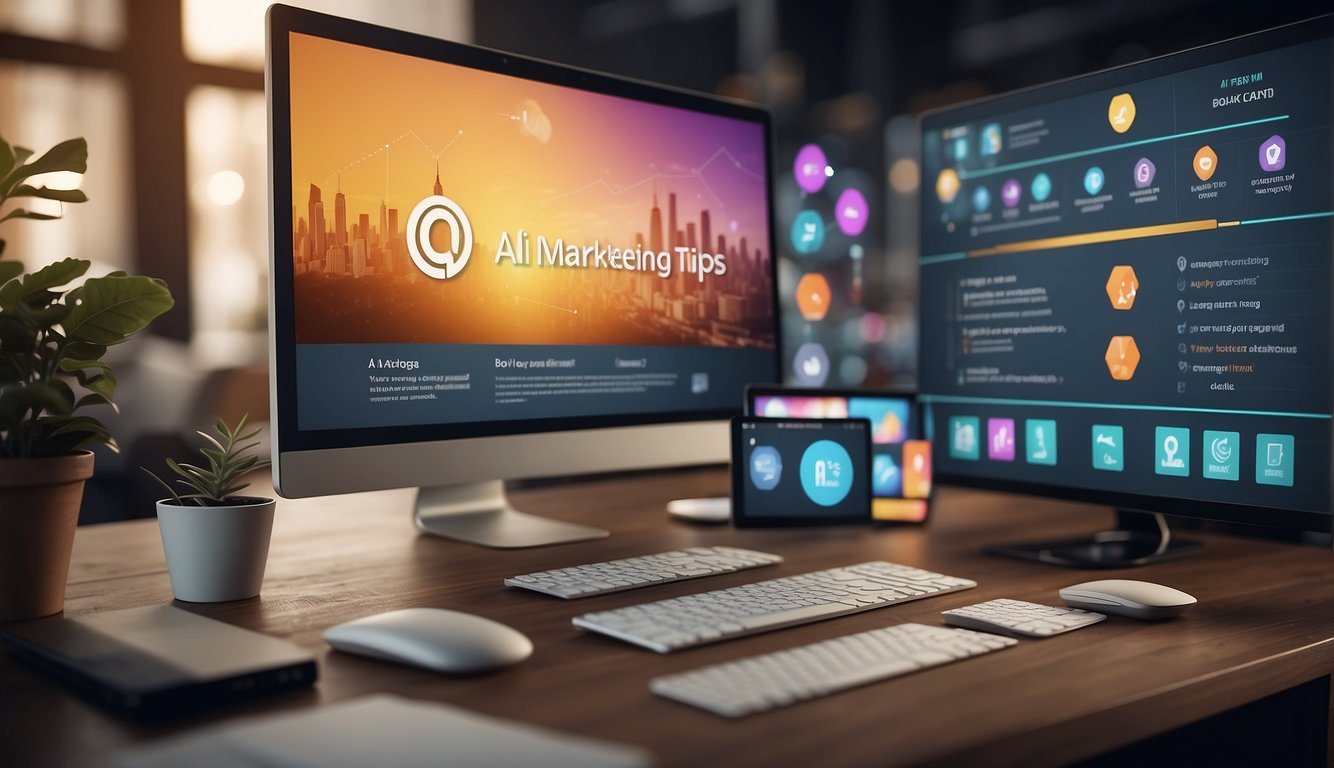Navigating the AI Marketing Landscape: Practical Tips for EOS Entrepreneurs
Have you ever wondered how artificial intelligence (AI) could spice up your marketing strategy? As the business environment gets more competitive by the day, savvy marketers are turning to AI to gain an edge. Picture this: your marketing campaigns are personalized for each customer, your analytics are predictive rather than reactive, and your content is relevant when your audience needs it. Sounds like a dream, right? Well, with AI it’s entirely within reach!

So, what exactly can AI do for your marketing? Think about improved customer insights, automation of routine tasks, and more efficient ad spending. Did you know that algorithms can now accurately predict customer behavior and preferences? This means you can launch targeted campaigns that truly resonate with your audience. Or how about chatbots? They’re not just for answering frequently asked questions anymore; they can provide personalized shopping experiences that keep your customers coming back for more.
Remember, integrating AI into your marketing efforts isn’t just about the cool tech; it’s about creating more value for your customers and driving better results for your business. Whether you’re just getting started or looking for ways to enhance your current marketing tactics, some AI-powered tools and techniques can propel your business forward. Let’s break down some essential tips and strategies to ensure your marketing is intelligent, impactful, and, most importantly, customer-centric.
Understanding AI in Marketing
https://www.youtube.com/watch?v=d2UlKtPPz-4&embed=true
Artificial Intelligence (AI) has become the silent wingman for marketers, offering insights and efficiency like never before. Have you ever wondered how it’s reshaping the marketing landscape? Let’s dive in and explore the specifics.
Defining AI Marketing
At its core, AI Marketing is using artificial intelligence technologies to make automated decisions based on data collection, analysis, and additional observations of audience or economic trends that might impact marketing efforts. For example, AI algorithms can chew through large data sets, picking out your audience’s buying patterns or preferences, which can be used to tailor marketing strategies. Essentially, it’s a powerhouse tool for personalization at scale.
The Growth of AI in the Digital Landscape
AI’s role in marketing is not just growing; it’s fundamentally transforming the industry. A staggering 61% of marketers say artificial intelligence is the most important aspect of their data strategy. With digital footprints expanding and touchpoints multiplying, AI-driven analytics play a critical role in understanding customer journeys. Moreover, the use of chatbots for customer service and predictive analysis for forecasting customer behaviors are practical examples showing the technology’s deep integration into digital marketing.
Strategizing with AI
https://www.youtube.com/watch?v=BCwaFE4-01Q&embed=true
Incorporating AI into your marketing strategy isn’t just about jumping on the latest tech bandwagon. It’s a thoughtful process of aligning cutting-edge technology with your brand’s core goals and vision. Let’s get into how you can do this seamlessly.
Setting AI-Driven Marketing Goals
When setting your goals, think of AI as your savvy assistant, ready to crunch numbers and spot trends with superhuman speed. To benefit fully, you’ll want to:
- Define Clear Objectives:
- Increase Sales: By what percentage?
- Boost Engagement: How will you measure success?
- Identify Key Performance Indicators (KPIs):
- Click-through rates (CTRs)
- Conversion rates
- Leverage Predictive Analysis:
- Forecasting future trends from existing data
- Tailoring marketing campaigns accordingly
By breaking down your aspirations into tangible, AI-driven goals, you’re essentially creating a roadmap that leverages technology for optimal outcomes.
Aligning AI With Brand Vision
Your brand has a unique story, and AI should amplify, not distort, this narrative. Here’s how you can synchronize the two:
- Ensure Ethical AI Use:
- Maintain transparency with your audience.
- Respect data privacy and consent.
- Tailor AI to enhance brand experience:
- Chatbots for instant customer service embodying your brand’s voice.
- Recommendation engines that align with your customers’ values and interests.
Through these steps, you’ll be able to maintain the integrity of your brand identity while harnessing the power of AI. Remember, the goal isn’t to let AI take over; it’s to integrate it in a way that feels organic and true to your brand.
AI Marketing Tools

Staying ahead in the marketing game often means embracing the latest technology, and AI tools can give your campaigns an edge. Let’s explore some specific AI marketing tools that could boost your strategy.
CRM and AI Integration
Integrating AI with your Customer Relationship Management (CRM) systems turns data into actionable insights. Here’s what you need to know:
- Salesforce Einstein: Salesforce’s AI uses machine learning to analyze your CRM data, predicting customer behavior and recommending next steps for your sales team.
- HubSpot CRM: Combines a suite of tools with AI to help you prioritize leads and automate tasks.
AI-Powered Content Creation
Content is king, but creating it is time-consuming. AI to the rescue:
- GPT-3: OpenAI’s language processing tool generates human-like text, perfect for drafting articles or product descriptions.
- Articoolo: Creates unique content from a given topic, using NLP to ensure readability.
Email Marketing Automation
Personalized emails, without the manual work? Here are the tools:
- Mailchimp’s Smart Send: Decides the optimal send time for each user based on data analytics.
- Constant Contact’s AI: Offers powerful tools to segment your audience and tailor content accordingly.
Data-Driven Decisions

Making smart marketing moves today means letting data lead the way. You’ve got numbers and trends at your fingertips, so why not use them to your advantage?
Leveraging Big Data
Big data isn’t just a buzzword—it’s your new best friend in marketing! Imagine having insights from millions of customer interactions. You can harness this information through:
- Real-time analytics: Track customer behavior as it happens, and adjust your marketing strategies accordingly.
- Customer journey mapping: Understand the paths your customers take to make purchases, and tweak your touchpoints for better results.
Predictive Analytics
Think of predictive analytics as your crystal ball for marketing. It uses data, statistical algorithms, and machine learning techniques to forecast future customer behavior, helping you to:
- Target effectively: Identify which leads are likely to convert and focus your efforts where it counts.
- Anticipate trends: Stay ahead of the curve by knowing what your customers will want next.
Customer Segmentation
Here’s a secret: Not all your customers are the same. Split them into distinct groups based on their behavior and preferences to:
- Tailor messaging: Craft personalized communication that resonates with each segment.
- Optimize resource allocation: Direct your marketing resources where they’re likely to have the greatest impact.
Personalization and AI

Leveraging AI for marketing is like giving a megaphone to your brand that whispers personally into each customer’s ear. Personalization in AI doesn’t just mean addressing your customer by name; it goes well beyond into creating an experience that feels tailor-made for them.
Hyper-Personalization Techniques
Hyper-personalization is the ace in your marketing deck, it’s all about targeting your customers to a “T.” Here’s how you can make that happen:
- Data Collection: Use AI to gather comprehensive data from various touchpoints. This can include browsing history, purchase records, and social interactions.
- Predictive Analysis: Employ AI algorithms that can predict customer behavior and preferences based on the collected data.
- Custom Content: Generate personalized content like emails, product recommendations, and social media posts that react dynamically to user interaction.
Customized Customer Journeys
Imagine creating a map so accurate that it leads your customers straight to what they want. AI helps sculpt customer journeys that feel like a personal escort through the digital marketplace.
- Segmentation: Break down your audience into laser-focused groups using AI to analyze behaviors and preferences.
- Dynamic Interaction: Craft interactive experiences on your website or app that adjust in real time based on the customer’s actions.
- Feedback Loops: Use AI to analyze feedback and continuously refine the personalization process to keep the experience fresh and relevant.
Remember, personalization is not a one-off task. It’s a dynamic, ongoing process that keeps evolving with your customer. So roll up your sleeves and let AI do the heavy lifting!
Chatbots and Conversational AI

Ever had a late-night question for your favorite online store? Chatbots are your 24/7 answer buddies! They’re a staple in digital marketing, letting you chat anytime without waiting for a human to clock in. Isn’t that convenient?
Here’s how you can leverage chatbots for your business:
- Instant Customer Service:
- Non-stop support
- Quick responses to FAQs
- Improved customer satisfaction
- Personalized Shopping Experiences:
- Product recommendations
- Tailored offers and promotions
- Data Collection Dynamite:
- Capture customer preferences
- Track feedback trends
Remember, not all chatbots are created equal. Invest in AI-powered ones; they learn from interactions, getting smarter with each chat.
So, why Conversational AI?
- Higher Engagement: It’s like talking to a friend who knows your shopping list by heart.
- Always Learning: The more you chat, the better they understand your needs.
Tip Alert: Keep your chatbot’s tone friendly and informative. And don’t forget, a touch of humor is always appreciated!
| Feature | Benefit |
|---|---|
| Quick Reply | Saves time for you and your customers. |
| Adaptability | Grows with your customer’s needs. |
Interested in metrics? Well, businesses using chatbots see a significant uptick in customer engagement. Reports suggest users are 35% more likely to complete a purchase if a chatbot assists them.
In summary, integrate chatbots and AI into your marketing strategy to provide valuable, round-the-clock customer interaction. It’s a smart move—just like you!
Measuring AI Success

In the fast-paced realm of AI marketing, keeping a tab on success means understanding the impact of your AI tools on your campaigns.
Key Performance Indicators
Before diving into the intricacies of AI-powered marketing, ask yourself: What goals am I trying to achieve? Your answer is what you’ll measure through Key Performance Indicators (KPIs). Here’s a snapshot:
- Conversion Rates: Track the uptick in leads turning into customers.
- Customer Engagement: Measure likes, shares, and comments for content crafted by AI.
- ROI: Highlight the returns on AI investments versus traditional methods.
- Cost per Lead: Assess if AI efficiencies are saving you money on acquiring new leads.
With these KPIs in place, you’ll have a clear metric-based perspective of how AI is elevating your marketing game.
Real-Time Data Analysis
What if you could tweak your strategies on the fly? That’s where Real-Time Data Analysis comes into play.
- Monitor Campaigns: Follow your AI-driven campaigns as they unfold, spotting trends and making instant adjustments.
- User Behavior Insights: Understand how customers interact with your AI features in real-time.
- Predictive Analytics: Use AI-powered analysis to foresee customer actions and prepare responses.
Grasping real-time data helps you stay agile, making decisions that keep your marketing efforts sharp and on target.
Ethical Considerations

Incorporating AI into your marketing plans involves more than just boosting performance metrics; it’s equally about how ethically you handle AI implementation. Let’s unpack the ethics to keep your marketing strategies both effective and responsible.
AI Bias and Transparency
When AI models train on historical data, the risk of perpetuating existing biases is real. You wouldn’t want to favor one audience inadvertently, right? Here’s how to stay on top:
- Audit Algorithms Regularly: Ensure your AI isn’t developing or acting on biases by performing routine checks.
- Transparent Processes: Clearly outline how AI is applied in your campaigns. Even a simple explanation can build trust.
Privacy and Data Security
Protecting customer data is as crucial as any marketing goal. Here’s how you keep that data under a virtual lock and key:
- Adhere to Regulations: Keep abreast of laws like GDPR and CCPA. Staying compliant isn’t just good ethics, it’s smart business.
- Robust Security Measures: Implement strategies such as encryption and access controls to safeguard data. This isn’t just for show; it’s a fundamental aspect of customer respect.
Frequently Asked Questions

In this section, you’ll find direct answers to common inquiries about incorporating AI into your marketing strategies, cutting-edge tools, success stories, platform selection, educational courses, and characteristics of successful AI-driven campaigns.
What are some effective strategies for implementing AI in marketing campaigns?
To efficiently integrate AI into your marketing initiatives, start by identifying tasks that can be automated such as customer segmentation and campaign analytics. Utilize AI to tailor content to individual preferences, predict trends, and optimize your marketing spend by analyzing customer data for better targeting.
What AI tools are currently leading the way in enhancing marketing efforts?
HubSpot’s AI-powered tools for content strategy and Salesforce’s Einstein for customer insights are currently at the forefront. These tools help automate marketing tasks, provide valuable consumer behavior predictions, and enhance user experiences through personalized engagements.
Can you share examples of how AI has been successfully integrated into recent marketing initiatives?
A prime example is Spotify’s use of AI to personalize playlists, which significantly increases user engagement. Another success story is Starbucks’ AI-powered app that recommends products based on customer behavior, leading to increased sales and customer satisfaction.
How can marketers choose the right AI platform to elevate their brand’s presence?
When picking an AI platform, assess its ability to integrate with your existing systems and whether it supports the specific marketing functions you need. Look for platforms with robust analytics, scalable solutions, and strong customer support. Don’t shy away from requesting demos to see the platform in action.
What should I look for in an AI marketing course to stay ahead of the curve?
Select a course that covers the latest AI technologies in the marketing field, offers practical hands-on projects, and is taught by industry professionals with a successful track record. Ensure the curriculum is updated regularly to reflect current trends and advancements.
What do the most successful AI-driven advertising campaigns have in common?
The top AI-driven campaigns typically feature personalized content, predictive analytics for optimized targeting, and real-time adjustments based on user interaction. They ensure a seamless user experience while collecting data to continually refine and improve marketing tactics.








